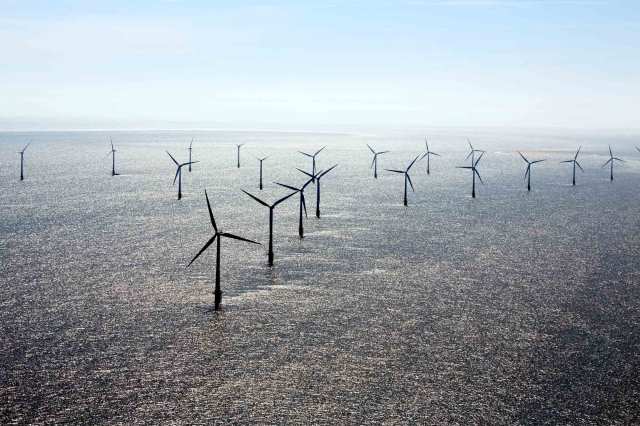Offshore wind farm – VICTOR DE SCHWANBERG/SCIENCE PHOTO LIBRARY

What is the most important thing to have happened to the United Kingdom in this decade? Brexit, right?
Well, maybe not. Looking back, future historians might just accord more significance to another recent development – the result of the latest government auction of contracts for new power generating capacity. Compared to Britain’s departure from the European Union, this might not seem that important, but it really is.
An auction is a process of price discovery, and what this auction revealed is that the price of offshore wind power has fallen to a record low. Reporting for the Telegraph, Jillian Ambrose sets out the key numbers:
“The contracts will grant offshore wind developers, including Dong Energy and Engie, a guaranteed revenue of just £57.50 per megawatt-hour of electricity produced in 2022/23. This is a sharp fall from the £74.75/MWh granted to Innogy and Statkraft’s Triton Knoll project, which will start up just one year earlier, and less than half the cost of turbines already producing power at around £150/MWh.”
Costs were always expected to fall, but not as far and as fast as that. The expectation was that offshore wind would remain significantly more expensive than onshore wind, gas-fired power and even nuclear power.
This upsets previous calculations – not least the decision to go-ahead with Hinkley Point C, a new nuclear power station, contracted to provide electricity at a cost of £92.50/MWh. Compared to the new normal for offshore wind this looks like truly appalling value for money.
In fact, it’s much worse than it first appears. Hinkley won’t start generating electricity until the second half of the next decade (assuming no further delays) – and will receive its guaranteed price for 35 years instead of the 15 years given to new renewable capacity (including offshore wind).
Furthermore, this multi-decade commitment of subsidy is propping up an ailing French industry; in contrast to offshore wind which has the potential to be a major export opportunity for the United Kingdom. Even without exports, the scope for domestic expansion is vast: Britain is surrounded by windy, but conveniently shallow, seas.
Offshore wind isn’t the only renewable technology making rapid progress. In America, solar power is surging ahead. Megan Guess for Ars Technica reports on the latest developments:
“On Tuesday, the Department of Energy (DOE) announced that utility-grade solar panels have hit cost targets set for 2020, three years ahead of schedule. Those targets reflect around $1 per watt and 6¢ per kilowatt-hour in Kansas City, the department’s mid-range yardstick for solar panel cost per unit of energy produced (New York is considered the high-cost end, and Phoenix, Arizona, which has much more sunlight than most other major cities in the country, reflects the low-cost end).”
Guess adds that hardware costs have come down so fast that so called ‘soft costs’ like installation now account for much or most of the cost of solar. This would suggest that future developments like the use of robots or the direct incorporation of solar cells into building materials could cut even deeper into the cost of new capacity.
Even as things stand, the best renewable options are now competitive with dirtier forms of energy. One might therefore expect those who opposed green energy on affordability grounds to be happy. Sadly, the soi dissant free marketeers who campaigned so vigorously against green energy have been far from gracious in defeat – despite being proved wrong by the market.
To be fair, they weren’t completely wrong. There are many examples of bad green policy and the sceptics were right to point them out. But while constructive criticism is always justified, the same cannot be said for unrelenting negativity – especially from those who claim to offer an optimistic alternative to environmental doom and gloom.
A while back, I wrote about the ‘New Optimists’ – a loose coalition of thinkers who believe there’s a lot more going right in the world than going wrong. The best of them recognise that we do face serious challenges, including environmental challenges like climate change, but they have faith that human goodwill and ingenuity will win the day.
Quite right too. There is every reason to think that the market forces of competition and innovation (with some judicious support from the state) can indeed find affordable, sustainable solutions to the problems we face as a species.
The rapid progress made on renewable energy should be all the proof we need.










Join the discussion
Join like minded readers that support our journalism by becoming a paid subscriber
To join the discussion in the comments, become a paid subscriber.
Join like minded readers that support our journalism, read unlimited articles and enjoy other subscriber-only benefits.
Subscribe